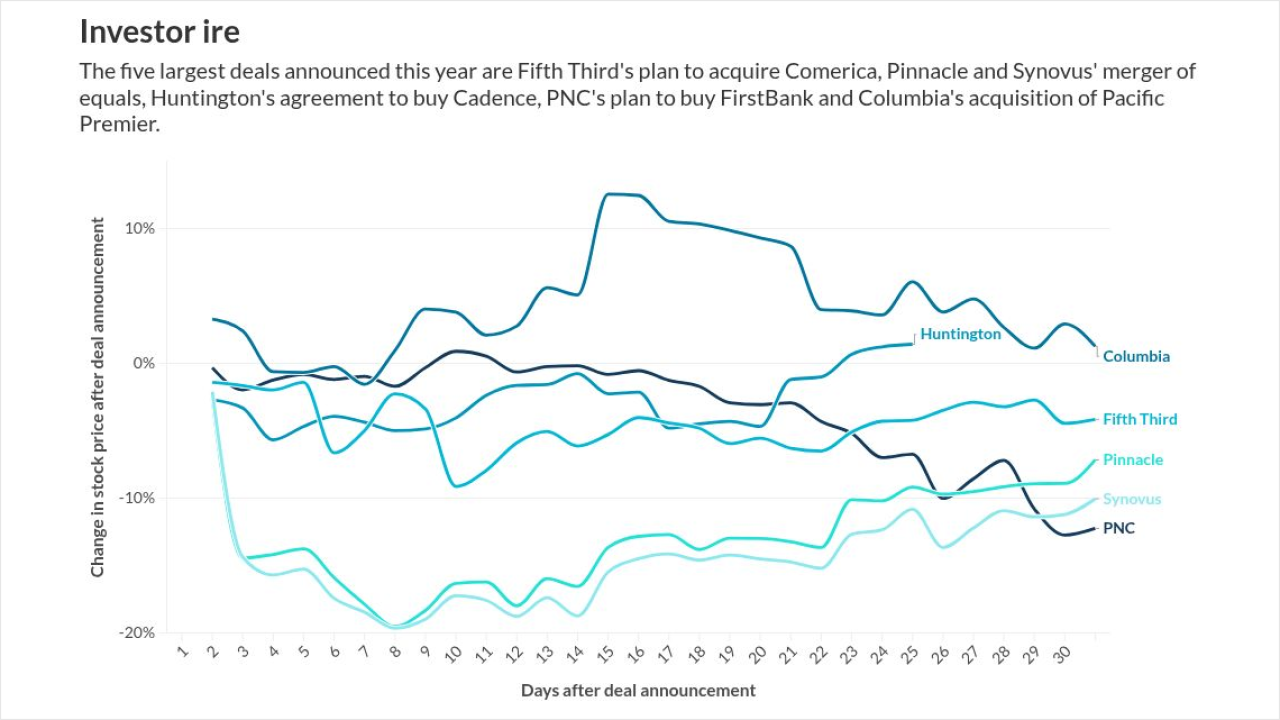It was not long ago that Canadian Imperial Bank of Commerce was drawing praise for its strategy of opening Amicus kiosks in supermarkets and using them as a U.S. launching pad.
Gradually it has grown apparent that Amicus Financial, the Internet-based banking subsidiary established in 1997, has become a huge drag on CIBC's earnings. John Hunkin, the parent company's chief executive officer, warned investors last month that the division would be to blame for poorer-than-expected third-quarter results, and said that CIBC might sell it, close it, or seek a "strategic partner."
Amicus operates as a remote bank in both Canada and the United States, with customers doing business online either on their own personal computers or at retail store pavilions, at automated teller machines, and by telephone. The Canadian part of the business is faring better than the U.S. part, which does business out of Winn-Dixie and Safeway supermarkets.
Amicus' services are offered under the name Safeway Select Bank in Safeway stores in the West, as Marketplace Bank in Winn-Dixie supermarkets in the Southeast, and as President's Choice Financial in Canada's Loblaw chain. The franchise has signed up 177,000 customers in the United States and 995,000 in Canada, and has amassed assets of $8.4 billion, 22% of them in the United States.
The branding strategy was considered pioneering when it was unveiled but apparently has done about as poorly as Bank One Corp.'s effort to build a separate online brand out of Wingspanbank.com.
Tom Woods, CIBC's chief financial officer, said that low interest rates in the United States are the main issue. "The predicted spread that anybody looking at a banking business two or three years ago thought they might achieve - versus what's actually achievable in this kind of value proposition - has turned out to be much narrower just because of the low level of rates," he said.
The problem has been compounded by the "much slower pace of loan product buildup," Mr. Woods said, adding that CIBC introduced the Amicus pavilions slowly and used stringent risk controls in making loans. But the weak growth in Amicus deposit accounts was also a disappointment.
Though "the loan side certainly didn't grow at the rate we thought it would have," Mr. Woods said, CIBC considers the Amicus strategy viable just the same. "The appeal of the product we think still remains," he said. In Winn-Dixie and Safeway, "We've got two very good partners with very large volumes of walk-by captive traffic, and that's the franchise, if you will."
Mr. Hunkin, the CEO, said that CIBC is pursuing a partnership that would help it lighten its load in the United States. In the third quarter, the drag on per-share earnings for Amicus was 15 cents - 3 cents for Canada and 12 cents for the United States, Mr. Hunkin said. Last year, the overall drag on earnings was 67 cents, again mainly from losses in the United States.
Mr. Hunkin told investors and analysts in a Webcast conference call that for the remainder of the year the earnings drag would be no worse than 67 cents per share, but when pressed about next year's Amicus earnings, he said: "I'm confident that the drag on earnings will be less than 50% of what it was this year. I feel very confident at this time."
But Mr. Hunkin could not say what the ultimate plan will be for Amicus' U.S. arm. "We were considering all possibilities," he said. "What we've committed to do is make a decision before the end of this fiscal year on how we plan to go forward with Amicus in the United States. We continue to have discussions with possible partners.
CIBC is still progressing. In the third quarter it built 41 pavilions in the United States, 13 more than it built in the second quarter. Overall it has 341 pavilions in the United States and 211 in Canada.
Analysts said the Toronto company had several options. "One possible outcome, rather than shutting down the partnerships, they might stop expanding them," said Michael Goldberg, an analyst at Desjardins Securities in Toronto. "It's been a very expensive start-up."
Mr. Goldberg said that finding a partner to invest in Amicus would be the best option for CIBC because it would "keep the expansion going, and demonstrate the value in the whole initiative," he said. "It would demonstrate that even though this operation isn't earning money right now, it still has a lot of value."
Sachin Kewalramani, an analyst at Morgan Stanley & Co., said CIBC has to address the issue fairly soon because "investors are getting a little impatient."





